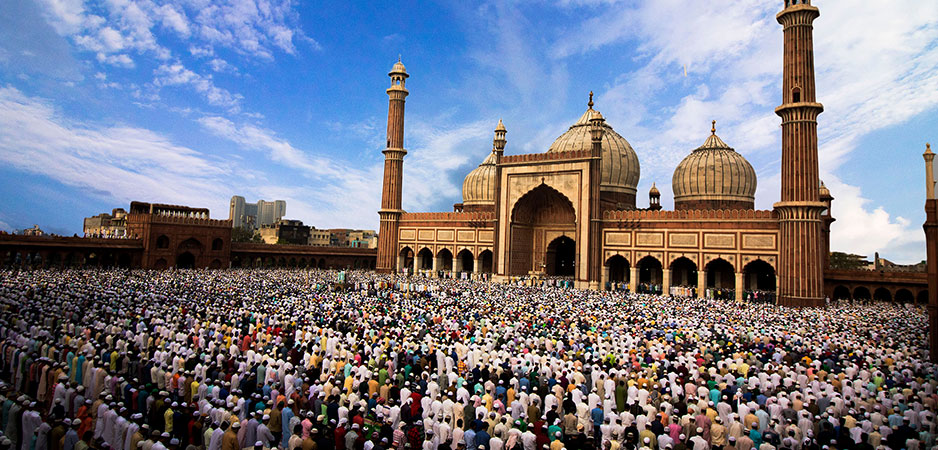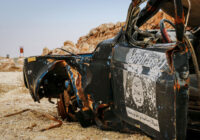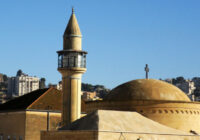Every year during the festival of Eid al-Adha, Muslims around the world sacrifice an animal — a goat, sheep, cow or camel — to reflect Prophet Ibrahim’s (Abraham) willingness to sacrifice his son, Ismail (Ishmael), after Allah (God) instructed him to in a dream. Before he could do so, Allah stopped Ibrahim and gave him a lamb to sacrifice instead. Commemorating this act of obedience to Allah on Eid al-Adha is known as udhiya (or qurbani), the Arabic word for sacrifice.
Traditionally, a Muslim should donate at least one-third of the meat from the animal to poor or vulnerable people. The remainder of the meat is split into one-third for the family that offers the udhiya and the final third to their neighbors. Muslims who live in the West often donate money to charities that conduct the sacrifice on their behalf in places like Somalia, Bangladesh and Syria.
Interactive: Ramadan Explained
The Quran explicitly mentions, “That they may witness benefits for themselves and mention the name of Allah on known days over what He has provided for them of [sacrificial] animals. So eat of them and feed the miserable and poor” (Al-Haj 22/28). Further, it says: “And the camels and cattle We have appointed for you as among the symbols of Allah ; for you therein is good. So mention the name of Allah upon them when lined up [for sacrifice]; and when they are [lifeless] on their sides, then eat from them and feed the needy and the beggar. Thus have We subjected them to you that you may be grateful” (Al-Haj 22/36).
Muslims believe the Quran is Allah’s final revelation that is still preserved to this day. According to Islamic teaching, while the udhiya should be of an animal, the flesh and blood do not reach Allah. In fact, nothing in its “form” is an offering to Allah. Rather, the act is a way of showing piety. It is the intent behind the udhiya that is important. Having said that, the act of sacrifice itself is a way to assess the intent behind it. Conversely, if we hold the view that mere intention is enough, then all acts of worship could be done away with. This is not the case in Islam.
How Does It Benefit Others?
According to the most recent UN estimates, more than 736 million people live below the international poverty line as of 2015. The United Nations mentions that around 10% of the “world population is living in extreme poverty and struggling to fulfil the most basic needs.” The World Bank adds that in “most parts of the world, growth rates are too slow, and investment is too subdued to increase median incomes. For many nations, poverty reduction has slowed or even reversed.”
Around the world, the income gap between citizens is steadily widening and food insecurity and malnutrition continue to be major problems plaguing our societies. A mere glance at the food and nutrition data from across the world is enough to understand the magnitude of this problem.
So, with this in mind, there will always be enough people in need of the meat from the sacrificed animal on Eid al-Adha. In fact, in all my years of performing this act in several developing countries, we have always run out of meat. Invariably, there are many needy people in places like Nigeria or India who look forward to this annual ritual so they can feast at home. Yet there is never enough meat to go around.
Freedom to Choose
Giving to charity is one of five pillars in Islam, the fundamentals on which the religion is built. Charitable actions — which can include non-monetary ones — are split between zakah (compulsory charity) and sadaqa (voluntary). These acts hinge all on the element of piety and intent, but to group them all together or replace one with the other does not appear to be a good idea.
It is true that udhiya is not fard (compulsory) in Islam. Some Muslims believe it is wajib — compulsory for those who have the means to do so — while others believe it is sunna muakkada (recommended). So, if one chooses not to sacrifice an animal on Eid al-Adha, it is purely an individual choice and they are free to act according to their qiyas — i.e., the interpretation of the scriptures — and there are many schools of thought in Islam.
For Muslims, the intention behind all acts of worship is of utmost importance. A person who performs an act of worship to show off does not really earn credit from Allah. It is the act of worship performed with the right intention that counts.
The views expressed in this article are the author’s own and do not necessarily reflect Fair Observer’s editorial policy.
Support Fair Observer
We rely on your support for our independence, diversity and quality.
For more than 10 years, Fair Observer has been free, fair and independent. No billionaire owns us, no advertisers control us. We are a reader-supported nonprofit. Unlike many other publications, we keep our content free for readers regardless of where they live or whether they can afford to pay. We have no paywalls and no ads.
In the post-truth era of fake news, echo chambers and filter bubbles, we publish a plurality of perspectives from around the world. Anyone can publish with us, but everyone goes through a rigorous editorial process. So, you get fact-checked, well-reasoned content instead of noise.
We publish 2,500+ voices from 90+ countries. We also conduct education and training programs
on subjects ranging from digital media and journalism to writing and critical thinking. This
doesn’t come cheap. Servers, editors, trainers and web developers cost
money.
Please consider supporting us on a regular basis as a recurring donor or a
sustaining member.
Will you support FO’s journalism?
We rely on your support for our independence, diversity and quality.






